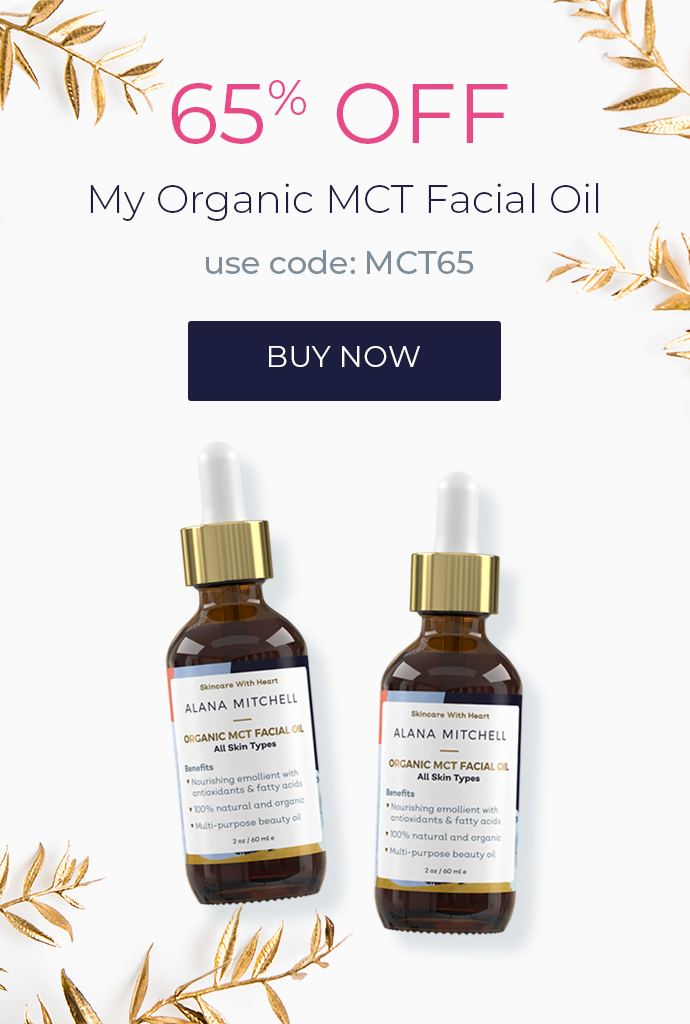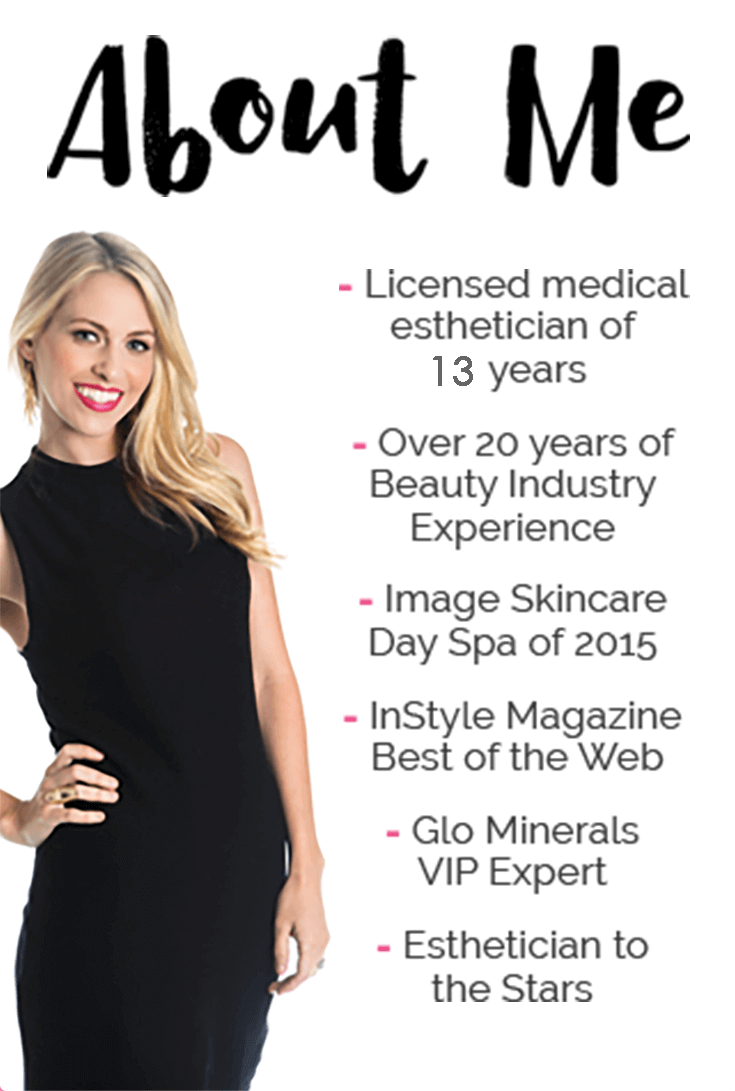What Should You Be Using In Your Skin Care Routine?
Take my quiz and get personalized recommendations from a
licensed esthetician!
The Top 40 Things to Know About Vitamin C - Wait Until You See #35!
We all know that vitamin C can do a body good.

We’ve grown up hearing about how we should get plenty of vitamin C and drink our orange juice.
But some of us still aren’t getting enough!

Experts recommend getting your daily dose of the vitamin (65 to 90 mg per day) through a healthy, balanced diet to help support your immune system and overall health.
Did you know that vitamin C can also do amazing things for your skin?
Enter vitamin C skincare!
This powerful vitamin has been steadily climbing the beauty trend ladder and gaining popularity for its potent ability to naturally improve skin, fight signs of aging, and improve collagen production to save us from the sag.
I've personally chosen to feature vitamin C as the superstar ingredient in my daily moisturizer - it features 20% of Sodium Ascorbyl Phosphate.
Here's a link to check it out.
My other favorite products with vitamin C are the Image SkinCare Vital C Hydrating Eye Recovery Gel, Epicuren CXc Vitamin C Anti Aging Cream, and the Dermaquest C Infusion Serum.
Today, I’m excited to tell you all about vitamin C skincare and give you 40 things you need to know before adding it to your regimen!

What Is Vitamin C?
- Vitamin C is often included in moisturizers and serums. A serum is a skincare product with a thin, silky texture.
While a moisturizer’s main job is to hydrate skin, serums typically include a higher concentration of ingredients to penetrate the skin and efficiently target skincare concerns such as hyperpigmentation or signs of aging. Make sure to select the right one for your skin type!
2. Vitamin C products contain a high concentration of vitamin C (duh) as an active ingredient, mainly in the form of L-Ascorbic Acid (LAA) as well as a few other varieties (more on that in just a bit).
3. The concentration of LAA in vitamin C serum can vary anywhere from 10% to 15-20%.
4. It’s a good idea to start with a lower concentration and wait until your skin adapts before moving on to a higher concentration in your skincare regimen.
Different Forms of Vitamin C
Vitamin C comes in a variety of forms and derivatives.
Below are forms of vitamin C that include an additional component to stabilize it and give it a longer shelf life.
Here’s a quick rundown of the characteristics of each form and what they can do for you!

- What Is L-Ascorbic Acid (LAA)? This is vitamin C in its most potent form, and LAA has the most research backing it to show effectiveness. However, it’s less stable than other forms and can cause skin irritations in high doses. If you try it, and your skin is cool with it, then this is your best bet for results.
Best for: potency and results, normal or oily skin
- What Is Magnesium Ascorbyl Phosphate? This water-soluble derivative of vitamin C is more stable (meaning it won’t degrade as quickly as other forms). It also causes less skin irritation, so this is the best form if you have sensitive or dry skin.
Best for: dry or sensitive skin
- What Is Ascorbyl Palmitate? This is a more stable form of vitamin C and is commonly used in oil-based skincare formulas. While it’s not as potent as other forms, its power move is fighting free radical damage to protect against signs of aging and repairing skin.
Best for: repairing free radical damage
- What Is Ascorbic Glucosamine? This is a water-soluble derivative of vitamin C. It’s often used for its antioxidant and skin-brightening properties, although more research is needed on its actual effectiveness.
Best for: hyperpigmentation
- What Is Tetrahexyldecyl Ascorbate? This is the newest member of the vitamin C family. It’s more stable than the other members, and its fat-soluble makeup makes it easier to penetrate into deep layers of skin.
Best for: general skin treatment
- What Is Sodium Ascorbyl Phosphate? A stable, water-soluble derivative, this form of vitamin C is gentle on skin and converts to ascorbic acid after it’s absorbed. It effectively brightens skin and battles free radical damage with antioxidants. I've personally chosen this form of vitamin C in my own moisturizer formula.
Best for: brightening and fighting free radical damage
Other Ingredients That Are Often Included Alongside Vitamin C
These ingredients are often added to help stabilize vitamin C and offer some additional benefits to pack a punch!
- What Is Hyaluronic Acid? HA is a powerful humectant that works to grab onto moisture and bind it to the skin. It improves your skin’s ability to hold hydration and infuse it into deep layers. This helps diminish fine lines and signs of aging, and provides skin with intense moisture!
- What Is Vitamin E? Vitamins C and E are both members of the antioxidant gang, and they work better together by fighting collagen-busting free radicals and supporting skin’s lipid barrier. This means more supple, youthful skin for you!
- What Is Ferulic Acid? This is another antioxidant which helps boost and stabilize both vitamins C and E. It also aids in fighting free radical damage to support collagen production.

What Are the Benefits of Vitamin C for Skin?
- Boosts Collagen Production
Age and sun damage cause us to lose collagen, leading to wrinkles and sagging skin. Vitamin C boosts your skin’s collagen production to give you firmer, more plump skin and smooth out fine lines and wrinkles.
- Fights Free Radical Damage and Signs of Aging
The antioxidant properties of vitamin C help fight free radicals and damage caused by UV radiation. The result is anti-aging action for younger-looking skin!
- Brightens Dark Spots
Vitamin C helps lighten hyperpigmentation and brown spots. It also inhibits melanin production for evening skin tone and brightness.
- Skin Repair
It helps to repair damage from sun exposure and collagen loss by encouraging healthy cell turnover and regeneration. Some users have noted that it helps fade scars as well.
- Helps Protect the Skin Against Sun Damage
Vitamin C gives you some added sun protection by thickening the dermis layer of the skin to help guard it against harmful UV rays and sun exposure.
Important Note: This does not mean that vitamin C moisturizers and serums are a replacement for sunscreen or SPF protection! While it can help boost the deeper layers of your skin, you still need to protect the top layer with sun protection. Wear a daily SPF any time you’re heading outside, regardless of whatever else you use in your skincare routine!
How Do I Use Vitamin C Products?
The general rule for skincare order of operations is to work thin to thick.
Apply formulas with a thinner consistency first so they have a chance to absorb into skin before applying thicker products.

- When to Apply: If you’re using a vitamin C serum, apply to freshly cleansed and slightly damp skin. If you follow your cleanser with a pH balancing toner, wait for the toner to completely dry before applying the serum. If you’re using a vitamin C moisturizer, apply after any serums or target treatments.
- How to Apply: Use clean fingers to spread the serum or the moisturizer over your cleansed face, and don’t forget your neck! It benefits from the same skincare you give your face.
- How Much to Use: This comes down to personal preference. For serum, generally, start with a few drops. Many serums will tell you how many drops to use on the instructions label.
- Am I Using the Right Amount?: Wait 15 minutes for the serum to completely absorb before moving on to moisturizer. If there’s still a layer of serum sitting on the surface of your skin, reduce your amount. It should fully absorb into the skin.
- Finish It Up: Follow-up with any targeted treatments, and round out your routine with a moisturizer and eye cream. If you’re heading out for the day, make sure your moisturizer includes SPF protection (yes, even if it’s cloudy outside and even if your makeup contains SPF!).
Application Advice
- With vitamin C serum, start with a lower concentration, something in the 10% range. See how skin reacts and adjusts to this level before moving up to the higher concentrations of 15-20%.
- As with any new product, I always recommend that you do a patch test. Apply a small amount to the inside of the wrist or behind the ear, and wait 24-48 hours to make sure you don’t have a skin reaction before applying it to larger areas. If you do have a reaction, at least it's not all over your entire face!
- Remember that you may not see immediate results. It could take up to a few months to see if it’s working. Here are some tips to help you get the most out of your vitamin C skincare formulas:
- Follow application instructions.
- Use regularly. If you only apply once in a while, you won’t see results.
- Be patient. Don’t give up just because you don’t see immediate changes.
- Store correctly and adhere to use by/expiration dates to ensure the potency hasn’t been compromised.
What Is the Correct Way to Store Vitamin C Serum?
To keep your vitamin C serum from degrading or losing efficacy, take care of the serum so it will take care of you!
- Keep It Away From Light
LAA is vulnerable to oxidation from light exposure. That’s why vitamin C serums typically come in those pretty dark glass bottles. Keep the serum somewhere dark and away from direct light.
- Keep It Airtight
Oxygen can also break down vitamin C serum. Always put the cap back on and make sure it’s is screwed on tight to keep air from seeping in.
- Keep It Cool
High temperatures will degrade vitamin C. Some manufacturers suggest storing vitamin C serum in the fridge, but some advise against it, so consult your serum’s storage instructions or customer service if you have questions.
Either way, if you store your serum in a cool, dark place, you should be good!
Are There Any Side Effects to Using Vitamin C Products?

- Reactions and irritations to vitamin C can occur if you have allergies or sensitive skin. As I mentioned, it’s best to do a patch test to see how your skin will react before you go all-in.
- Such reactions and irritations include redness and tingling.
- If you have dry or sensitive skin, skip the L-ascorbic acid and go with the magnesium ascorbyl phosphate, which is gentler on the skin.
Do’s and Don'ts of Vitamin C Products
Here are a few tips for things to look for and things to avoid when it comes to using vitamin C in your skincare!

pH Balance
- DO look for a vitamin C serum with a lower pH level, something around 3.5. This will help with better absorption as it will reach the deeper layers of your skin for max results.
- DON’T use a lower pH serum if you have sensitive skin. Low pH = high acidity, which can irritate skin.
For a gentler formula, look for one that uses the magnesium ascorbyl derivative with a pH level of 5-6. Since this is closer to skin’s natural pH level, it will be more skin-friendly!
Interactions
- DON’T mix vitamin C serums containing L-ascorbic acid with retinol (vitamin A) or niacinamide (AKA vitamin B3, commonly used in skincare formulas).
Without getting into a complicated scientific explanation, the pH levels of these ingredients don’t get along with those of vitamin C, and they end up canceling each other out and rendering each other ineffective. The reaction may also cause redness.
- DO wait 30 minutes between applications of retinol or niacinamide and vitamin C serum to inhibit the two formulas from interacting with each other and to give your skin’s pH levels some time to normalize.
If you use a product that already contains a combination of these ingredients, don’t worry. It’s likely been formulated with a time release process that makes the ingredients active at different times so they don’t affect each other.
Appearance
- DO pay attention to things like color, smell, and consistency of your vitamin C serum to make sure it hasn’t oxidized.
- Color: Your serum should be clear, white, or a light champagne color. If it’s cloudy or dark in color, it may have already oxidized and should be returned or discarded.
- Smell: Vitamin C serum is typically odorless. If it smells sour or rancid, it’s no good.
- DON’T use serums sold in clear bottles. Vitamin C serum should come packaged in a dark glass or opaque bottle to protect it from light exposure.
Also, be skeptical of serums that are yellow or brown in color. Some manufacturers will add tints to hide oxidation. Vitamin C moisturizers may often have tint as the formulas are creamier, and contain other ingredients, but serums should typically be near colorless or clear.
DIY
- DON’T attempt to make your own vitamin C serum! It can be tempting to follow any one of the DIY tutorials out there that claim you can make your own formula, but unless you’re a chemist, you probably won’t get it exactly right. I can tell you a homemade version won’t be as effective or, worse, can end up causing skin irritation.
- DO leave it to the pros. They know how to make sure the pH level is correct for your skin, that the vitamin C component will stay stabilized for as long as possible, and add other skin-boosting ingredients.
This is just one of those areas where it’s worth it to splurge a little to save your skin!
Final Thoughts
Vitamin C does some amazing things for skin when we incorporate it into our regimen.
You can also enjoy its benefits by making sure you’re eating a healthy, balanced diet full of vitamins to nourish skin from the inside out!
Do you want to try vitamin C products, but still have questions or concerns? Share them in the comments section. I'd love to help!
My Other Favorite Vitamin C Skincare Formulas
Rhonda Allison C Peptide Complex
Form of Vitamin C Used: L-Ascorbic Acid
Skin Script Vitamin C/Green Tea Serum
Form of Vitamin C Used: L-Ascorbic Acid
Top Brands
New Brands

Recent Posts

Are You Taking the Right Steps to Care for Your Skin?
Take the Quiz
Skincare Secrets!
10-step guide for healthy, beautiful skin after kids.
100% privacy. I will never spam you!
















